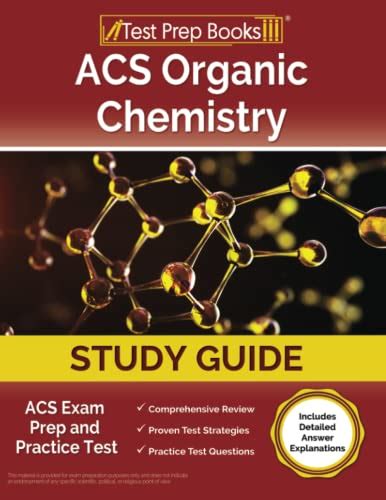Introduction

The ACS Organic Chemistry Exam is a rigorous test that assesses candidates’ knowledge and critical thinking skills in the vast field of organic chemistry. Passing this exam is a prerequisite for pursuing graduate studies in organic chemistry or securing employment in related industries. Preparing for this challenging exam can be daunting, but with the right strategies and resources, you can maximize your chances of success.
Understanding the Exam Format
The ACS Organic Chemistry Exam consists of 70 multiple-choice questions to be completed within 110 minutes. The questions cover a comprehensive range of topics, including:
- Structure and Bonding
- Reaction Mechanisms
- Synthesis and Analysis
- Spectroscopy
- Stereochemistry
Preparing for the Exam
1. Master the Textbook
Thoroughly study the assigned textbook and make comprehensive notes covering all key concepts and mechanisms. Utilize additional resources such as lecture notes, online videos, and practice problems to supplement your understanding.
2. Practice Regularly
Regularly solving practice problems is crucial for building your problem-solving skills and identifying areas that require improvement. Utilize online question banks, practice exams, and study guides to gain experience with various question formats.
3. Seek Clarification
Do not hesitate to seek clarification from your professor, teaching assistants, or peers whenever you encounter difficulties in understanding a concept. Seeking help early on can prevent misunderstandings and strengthen your foundational knowledge.
4. Test Your Knowledge
Periodically take practice exams under timed conditions to simulate the actual exam environment. This will help you assess your progress, identify weaknesses, and manage your time effectively.
Effective Strategies
1. Active Recall
Instead of passively reading notes, actively recall information by reciting concepts aloud or summarizing them in your own words. This technique enhances memory retention and strengthens understanding.
2. Spaced Repetition
Review material at increasing intervals (e.g., 1 day, 3 days, 1 week) to improve long-term retention. This strategy ensures that concepts remain fresh in your mind and prevents forgetting.
3. Concept Mapping
Create visual representations of concepts using concept maps. This technique helps you connect ideas, identify relationships, and visualize the structure of organic chemistry.
Common Mistakes to Avoid
1. Memorizing Without Understanding
Avoid simply memorizing reactions and mechanisms without understanding the underlying principles. True comprehension leads to better problem-solving abilities.
2. Neglecting Stereochemistry
Stereochemistry is a fundamental aspect of organic chemistry. Failing to consider stereochemistry in your responses will result in incorrect answers.
3. Misinterpreting Questions
Read questions carefully and identify the specific information being asked. Misinterpretations can lead to incorrect answers.
4. Spending Too Much Time on Difficult Questions
The exam is designed to be challenging. If you encounter a difficult question, move on and return to it later. Dwelling on tough questions can waste valuable time.
Conclusion
Preparing for the ACS Organic Chemistry Exam requires dedication, persistence, and effective strategies. By mastering the textbook, practicing regularly, seeking clarification, and utilizing proven techniques, you can build a solid foundation in organic chemistry and increase your chances of success on exam day.
Remember, the journey to conquer this challenging exam is not without its difficulties. However, with the right mindset, preparation, and support, you can overcome these obstacles and emerge triumphant.
Additional Resources
Table 1: ACS Organic Chemistry Exam Content Outline
| Topic | Percentage |
|---|---|
| Structure and Bonding | 20-25% |
| Reaction Mechanisms | 30-35% |
| Synthesis and Analysis | 20-25% |
| Spectroscopy | 10-15% |
| Stereochemistry | 5-10% |
Table 2: Recommended Study Schedule
| Week | Activities |
|---|---|
| 1-4 | Focus on foundational concepts, structure and bonding, and reaction mechanisms |
| 5-8 | Delve into more advanced topics, such as synthesis and analysis, and spectroscopy |
| 9-12 | Practice regularly, take mock exams, and review challenging concepts |
Table 3: Common Misconceptions in Organic Chemistry
| Misconception | Correction |
|---|---|
| All carbon atoms are sp3 hybridized | Carbon atoms can also be sp2 or sp hybridized |
| Bond lengths are always inversely proportional to bond strength | Bond order and polarity also influence bond lengths |
| NMR spectroscopy only provides information about the number of carbon atoms | NMR spectroscopy also provides information about the types of carbon atoms and their connectivity |
Table 4: Innovative Applications of Organic Chemistry
| Application | Description |
|---|---|
| Bioprinting | Creating 3D structures of living cells and tissues using organic materials |
| Carbon Capture | Developing novel materials for capturing and storing carbon dioxide from industrial emissions |
| Drug Design | Synthesizing and modifying organic compounds to target specific diseases and improve therapeutic outcomes |
